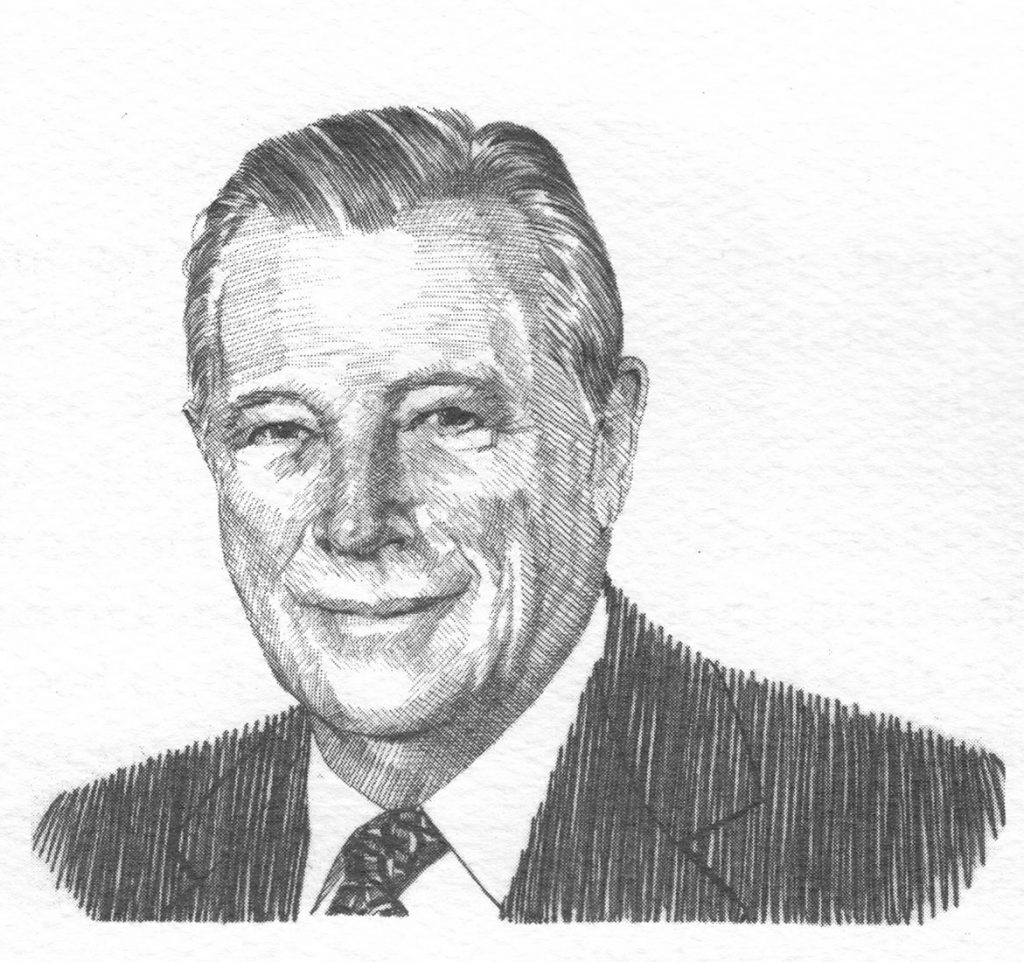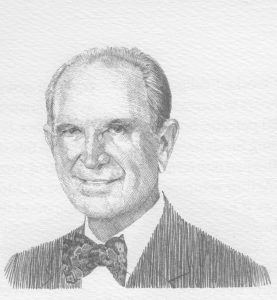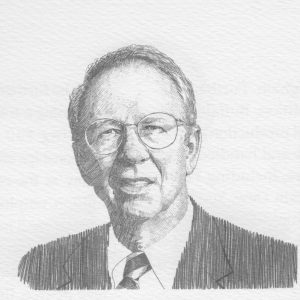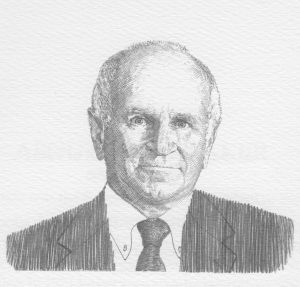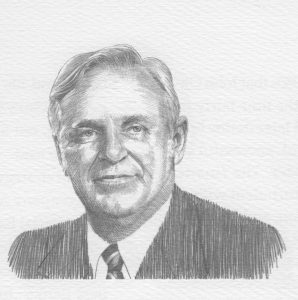In a world where cotton was king, no one was ever more worthy of the title of crown prince than Adolph “Bucks” Weil.
Born February 8, 1915, to parents Rossie Schoenhof and Adolph I. Weil, Sr., in Montgomery, Alabama, Adolph I. Weil, Jr. would rise through the ranks of his family’s business to become a legend in the rough-and-tumble cotton industry, and along the way become firmly ensconced in the ranks of the most noted philanthropists of his hometown and state.
Christened with the nickname of Bucks by a camp counselor impressed with the child’s “million-dollar smile,” young Adolph began compiling a prestigious education dossier at the tender age of five upon his enrollment in Miss Gussie Woodruff’s classes. From there he went on to Barnes, another Montgomery private school, and to Culver Military Academy. At 16 Bucks graduated from the academy and was admitted to Dartmouth, one of the youngest in his class. He spent summers in Weil Brothers-Cotton, Inc. offices in New York and Montgomery, and traveling abroad, refining an appreciation for art that would later be reflected in an impressive collection in the firm’s Montgomery offices. He graduated with a bachelor’s degree in English in 1935, with Harvard Law School next on the agenda.
But his heart was not in the law; family and friends said he played bridge more than he attended classes, and clearly had little interest in becoming an attorney. However, upon his graduation from Harvard in 1938 Bucks did make an application and was admitted to the Alabama Bar Association that same year. Later his tax law training would help him in business.
Bar association membership obtained, the young man went to work for his father and uncle at Weil Brothers-Cotton, a company founded by Bucks’ grandfather in 1878 in Opelika, Alabama. Bucks started at the bottom of the company as a “squidge,” sweeping floors and learning the art of grading cotton. Adolph, Sr. told Bucks that the younger man could not instruct others to do things unless he himself had done them and that others would not follow him unless he had done them. Earning $65 a month, the standard squidge wage at the time, Bucks began to diligently work his way to the top of the company.
In 1939, Bucks transferred from the Montgomery office to Dallas to broaden his knowledge about the cotton industry. Like everyone else, he had to trade cotton to get paid. In An American Harvest: The Story of Weil Brothers-Cotton, Bucks recalled a hands-on learning experience with his Uncle Leonel, with whom he traded cotton. “He tested me with a lot of questions, and I thought they required very involved answers when they were really very simple,” Bucks said. “He always reduces a problem to simplicity before he does anything.” The younger man would always remember that advice, even as he later became president and chairman of the board.
In 1941, Bucks was drafted into the U.S. Army Medical Service Corps. At the end of World War Il, in 1945 he returned from Europe to Weil Brothers and Butler, a branch of Weil Brothers-Cotton, Inc., in New York. It was a dedication to and preoccupation with the cotton industry that caused Bucks to almost miss the opportunity of a lifetime. While conducting business in New York with Daniel F. Rice and Co., Bucks fell in love with a picture of a lovely young lady on Ralph Kaufman’s desk. The young lady turned out to be Kaufman’s daughter, Jean. On their second date, Bucks’ unspoken worries about a tremendous crash in the cotton market dismayed the young lady, who found her beau boring and later told him she never wanted to see him again. These contretemps soon passed, however, and the couple married on February 4, 1946. They had three children: Adolph I. Weil, III, Laurie Jean Weil, and Jan Katharine Weil.
Before his marriage to Jean, Bucks faced one of the biggest challenges in his career. The company’s records had fallen into disarray, and Bucks’ job was to put them back in order. In addition to endless days of analyzing records, Bucks still found time to take on tasks no one else seemed to have time for. His father’s words of leading by example were truly exemplified during this time as the younger man reorganized the books and successfully continued to conduct business. After many taxing months, Bucks had become a true cotton man and a leader by example.
Continuing the family tradition, in 1950 Bucks and his brother Bobby became directors and officers of the company. They served as their father’s and uncle’s assistants and deputies and became increasingly involved in top-level decisions. While working with Weil Brothers, Bucks became heavily involved with industry organizations, serving as president of the American Cotton Shippers Association and Atlantic Cotton Association, and as a director of the New York Cotton Exchange and National Cotton Council. Following their father’s death in 1968, Bucks became chairman and his brother president of Weil Brothers-Cotton, Inc. With the cotton industry valued at $4.5 billion, Bucks and Bobby formed a holding company in 1980, Weil Enterprises and Investments, Ltd. The brothers assumed corresponding roles as Bucks became president and Bobby served as chairman of the holding company. In addition to expanding their grandfather’s business around the world, Bucks and Bobby were partners in Weil Hermanos, Inc., the Weil Selling Agency, and controlled the Swiss-based Unicosa. Working together, Bucks and Bobby built an empire in the cotton industry.
In 1995, tragedy struck the Weil family. Bucks, age 80, died December 12, 1995, because of a car accident in Montgomery. He left behind not only his wife, children, and five grandchildren, but also a legacy of philanthropy Throughout his career, Bucks donated generously – and often discreetly – to local endeavors. Bucks’ father had instilled in the younger man the belief of giving back to the community and set an example for his sons to follow with his anonymous donations.
Bucks more than fulfilled his responsibility to the community by serving as a board member of the Southern Research Institute, chairman of the Alabama Ethics Commission, and director of several organizations, including Goodwill Industries of Central Alabama, Tukabatchee Area Council Boy Scouts of America, Boy’s Club of Montgomery, American Cancer Society, United Way, and the Montgomery Food Bank, in addition to several other civic organizations. A project Bucks is most revered for was his personal crusade to save the Meals-on-Wheels program in the Montgomery area.
This Southern native’s commitment to and leadership in his hometown of Montgomery was recognized through several awards including the Alexis de Tocqueville Society Award; being named United Way’s Man of the Year, the Montgomery Area Council on Aging’s Senior of Achievement, and the Rotary Club’s Paul Harris Fellow; and the Montgomery Advertiser Citizen of the Year Award, which he shared with his brother.
Bucks was once honored by his daughter Laurie in a ceremony of the Jewish Federation of Montgomery. She said her father’s life always reflected Jewish values – the order provided by God’s laws, emphasis on education and family, and dedication to service to others.
Bucks Weil lived his values to the fullest and will be remembered always because of that.

